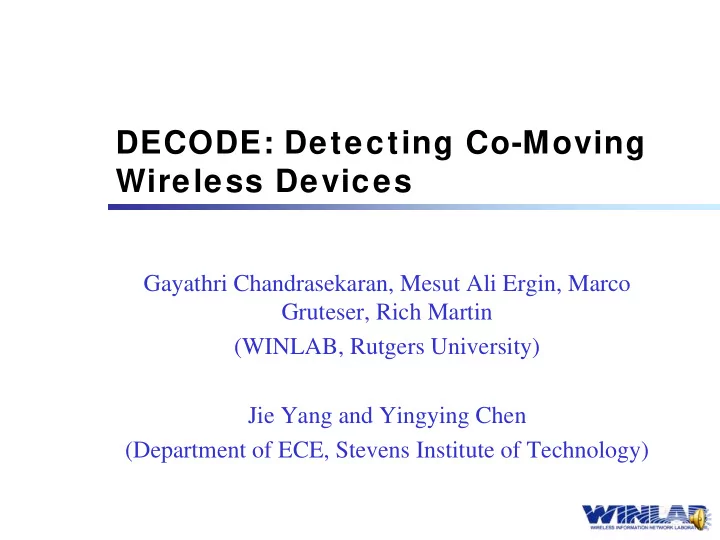

DECODE: Detecting Co-Moving Wireless Devices Gayathri Chandrasekaran, Mesut Ali Ergin, Marco Gruteser, Rich Martin (WINLAB, Rutgers University) Jie Yang and Yingying Chen (Department of ECE, Stevens Institute of Technology)
Co-Movement � Moving Together in Close Proximity – (~ Few Meters) � Movement of – Multiple Transmitters held by the same person – Multiple Radios attached on the same device.
Motivation � GSM <SIM ID> � Wifi <MAC Address> � Bluetooth <Bluetooth ID> How to map different Transmitters to a Device or Person ? - Friend Finder Application
Motivation: Social Network Mining Dynamic Human Social Network. � Viral Marketing (use pre-existing social networks to produce increases in brand awareness)
Localize and Estimate ? (X1,Y1)
Localize and Estimate ? Co- Mobile: Euclidean Distance < Threshold TRIVIAL ?
Localize and Estimate ? Co-Mobile Transmitters Position Estimates Are Not Stable
Approach � Detect Co-Movement by Observing RSSI – Co-Moving transmitters have Correlated fades – Dynamics of the environment are captured � Metric: Correlation Coefficient.
Properties of Co-Mobile Transmitters � Mobile: Small Scale Fading & Shadow Fading � Different Small Scale Fading � Similar Shadow Fading
Non- Co-Mobile Transmitters Different Small Scale And Large Scale Fading
Correlation Co-Efficient � Pearson’s Product Moment Correlation Coefficient:- Determines the Linear Relationship between two Random Variables (Observed RSSI from 2 Devices) � Ranges between [-1, +1] � +1 - Strong Positive Correlation � 0 - No Correlation � -1 - Strong Negative Correlation
Experiment Goals 1. Quantify Co-Movement detection rates 1. Within Same Technology 2. Across Different Radio Technology 2. Quantify the Effect of Speed on the time taken to detect co-movement
Experimental Setup 5
Detecting Co-Movement (Similar Radio - Wifi)
Impact of Speed on Co-Movement Detection Time Threshold = 0.6 Conclusion: 50-100 Sec of Observation Required.
Impact of Speed on Co-Movement Detection Time
Other Observations � Sampling rates have a little effect � Works with mixed radio technologies (in 2.4GHz band) motes, wifi � Correlation Co-Efficient Threshold = 0.6 yields High Detection Rates and Low False Positives � Detect Mobile Periods by Observing Variance(>3) of RSSI over time. Note: It only needs a single measurement node (base station)
Conclusion and Future Work � Simple and effective technique to Detecting Co- Mobile transmitters through signal strength analysis ( 2 minutes of Observation ) � Can work with just 1 receiver when the Localization infrastructure is Not in place � Future Work - Would a similar technique work outdoors using cellular signal strength information to detect co-moving cell phones?
QUESTIONS? Thanks !
Determining Threshold ( Τ )
Detecting Co-Movement (Different Radios) Co-mobile Mote and Wifi
Mobility Detection using Variance.
Impact of Sampling Rate in Co-Movement Detection Time
DECODE System Design
Summary � Simple and effective technique to Detecting Co- Mobile transmitters through signal strength analysis ( 2 minutes of Observation ) � Can work with just 1 receiver when the Localization infrastructure is Not in place � Can Work Across radio Technologies � Lesser Time with increased Speed. � Insensitive to Sampling Frequency.
Future Work � Would a similar technique work outdoors using cellular signal strength information to detect co- moving cell phones? � Application in Mind: Optimize phone Battery life by turning off the GPS for one of the Co-Mobile Devices. � How to Extend this to Detect Static Co-Located Transmitters?
Recommend
More recommend